Acura NSX And Honda NSX – Same Same But Not The Same
汽车专题The Acura NSX and Honda NSX are identical cars save for the badge, or so we thought. At a recent visit to Honda’s R&D Centre in Tochigi, Japan, we’ve learned that the differences between the two goes beyond just the badge.
At a glance, both the Acura NSX and Honda NSX appears to be the same cars, but there’s actually quite a number of differences between the two.
This is despite the fact that both Acura- and Honda-badged versions are produced at the same plant – at Honda’s new Performance Manufacturing Centre in Ohio, USA.
To recap, the NSXs sold in the USA, Canada and China will wear Honda’s premium brand Acura. In other parts of the world including Australia, Europe and Japan, the NSX will be sold under the Honda brand.
Acura USA has already launched the NSX earlier this year but the car will only go on sale in 2016. As such, prices have not been confirmed yet but a starting price of circa USD150,000 is to be expected – putting it within the same price bracket as the Porsche 911 Turbo, Audi R8 V10 and Mercedes-AMG GT, in the US at least.
As the NSX is a hybrid (three-motor full hybrid) all-wheel drive high performance car, comparisons with the plug-in hybrid BMW i8 are inevitable but the two are actually very different cars.
The i8 is a rather sporty-ish performance hybrid but its performance levels are well below that of the NSX, which is a proper supercar.
Honda has yet to release any official performance figures but 0-100 km/h times are expected to be well below 3 seconds, enough to see off any of the German trio, or even a Nissan GT-R.
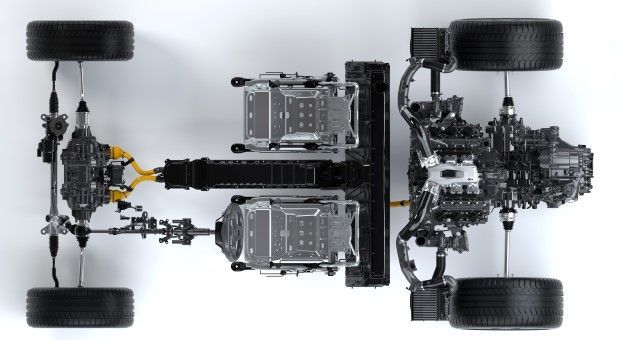
The mid-mounted longitudinal 3.5-litre 75-degrees bank angle twin turbo V6 produces 500 hp from 6,500 - 7,500 rpm, while 550 Nm of torque is sustained from 2,000 – 6,000 rpm. Performance is further boosted by a 76 hp (149 Nm) motor driving the rear wheels, and a pair of 36 hp (73 Nm) motors driving the front wheels. All these makes for a combined output of 573 hp.
In comparison, the plug-in hybrid BMW i8 has a combined output of 357 hp. The i8 takes 4.4 seconds to complete the century sprint, so clearly it’s in a different league.
Prior to the opening of the 2015 Tokyo Motor Show, Carlist.my had an opportunity to speak to NSX’s Large Project Leader Mr. Ted Klaus, at the Honda R&D Centre in Tochigi, Japan.
Both the Acura and Honda NSX were available for a brief two-lap familiarisation drive around the Tochigi’s oval test course. More on that later.
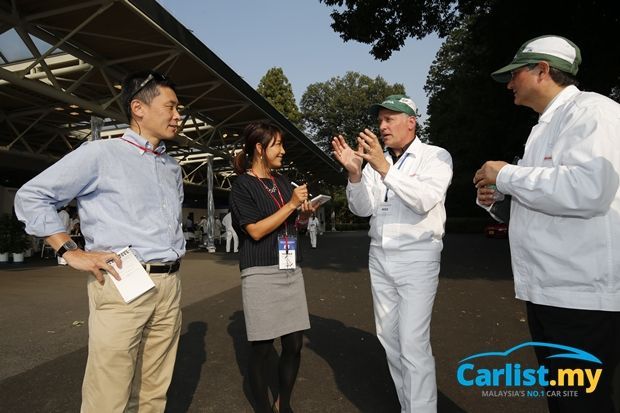
Speaking to Carlist.my, Klaus explained, “In terms overall performance levels, yes both cars are the same. But beneath the sheet metal there’s actually quite a number of differences between the two cars - most of them are due to regulations. For example, the Japanese market NSX needs to emit a specific beeping sound when it’s put into Reverse (it’s an audible warning that the transmission is in reverse, not to be confused with a reverse sensor).
“The hood hinges are also different. The hood on Honda models is equipped with a different hinge that pops out to push the hood upwards in the event of a collision with a pedestrian. This is to comply with pedestrian safety rules in Europe and Japan.
“As there are no such rules in the US, the Acura models didn’t need these hinges.”

Klaus also explained that the airbags fitted on Acura and Honda models are also different.
“In the US, airbags must be designed to accommodate unbelted occupants. This is very different from regulations in other parts of the world and as such, the restraint systems on the Acura models are very different.”
Apart from the badges, the most obvious difference between the Acura and Honda NSX are the headlamps.
Acura models have an amber turn signal lens to meet US regulations, while Honda models have a clear lenses.
Sharp eyed readers will notice that the show car at the 2015 Tokyo Motor Show wore a Honda badge but had amber turn signal lenses as well. That’s because the showcar was actually an Acura from the US (left-hand drive), with the badges swapped for the Tokyo motor show.
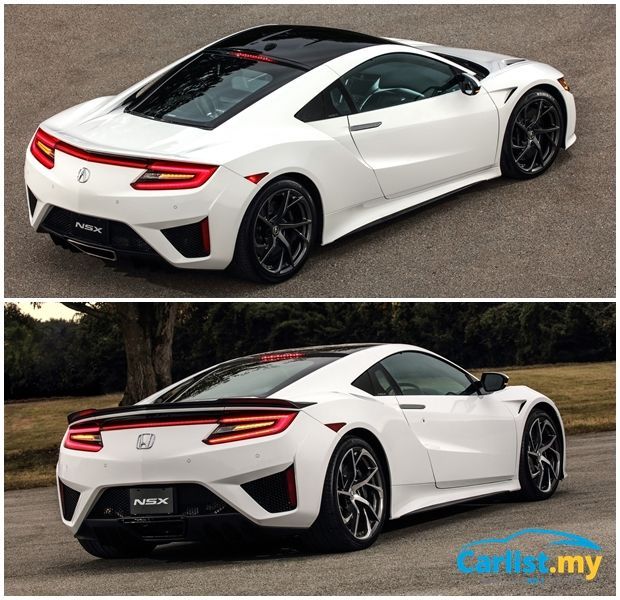
The white cars seen in the pictures here are a close representation of the actual production car.
Klaus is happy with the level of performance delivered by the three-motor SH-AWD hybrid system but he is keener to talk about how the NSX focuses on the driver – a trait which he believes sets the NSX apart from other supercars.
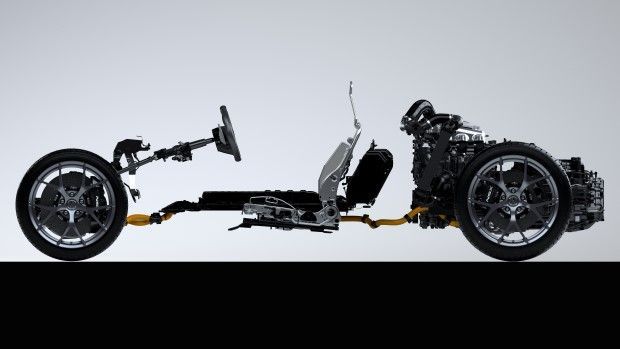
“The numbers are good but with the NSX, our focus goes beyond just numbers. Take the ‘human fit’ concept for example, our goal was to create a human-centered supercar that delivers a New Sports eXperience (NSX). It’s a car that’s friendly to the drivers of all skill levels,” said Klaus, who added that the NSX’s interior has been designed to accommodate up to the 90th percentile of the US population.
Indeed, words like ‘human-centric’ and ‘zero delay acceleration’ are used very often in Klaus’s presentation (which unfortunately, we weren’t allowed to take any pictures).
How Does It Drive?
My experience in the Honda NSX (right-hand drive model) ended all too soon, and since it was a smooth banked oval circuit, I could only explore a small portion of the NSX’s wide breath of abilities.
Pictures don’t do the NSX any justice. Its styling might not wow like a hypercar, but it looks a lot better in sheet metal – it projects just the right amount of aggression without being intimidating or offensive, purposeful without being overly racy. It’s a design that is likely to age very well with time.
There are no crowd pulling scissor or gullwing doors here. Push the beautifully anodised aluminium-finished door handle down to open the doors, the frameless door swings open to reveal an inviting interior.
Despite its low seating position, climbing into the NSX isn’t difficult at all thanks to the wide door aperture. Close the doors shut and you will notice that the pair of wing mirrors are mounted higher than they appear to be from the outside, aligning at your eye-level, giving you a very GT race-car feel.
Like many recent Acura models, the conventional gear lever has been replaced with a button-operated type layout. No, don’t worry you won’t hit accidently hit Reverse instead of Drive, as the two buttons are tilted at rather extreme angles. In fact, it is easier to mis-shift between Drive and Reverse on a traditional gear lever than on this button-type selector.
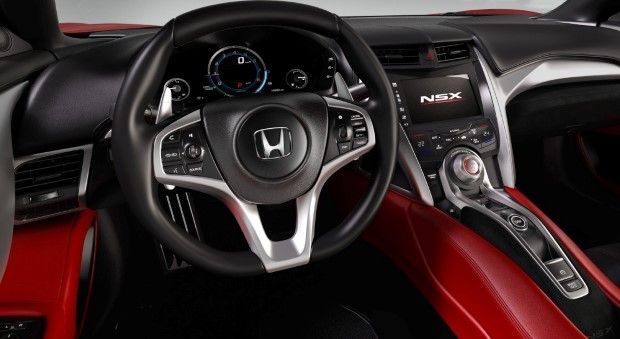
Inside, the NSX’s interior isn’t particularly luxurious. It’s more GT3 than GT. Yes, there’s generous use of leather, and the controls have good ergonomics designed into them, but the use of suede materials on the dashboard suggests a clear bias towards track driving performance rather than grand touring luxury.
The centre stack is dominated by a large rotary dial – the Integrated Dynamics System (IDS) - that you use to select Quiet, Sport, Sport+ and Track. Compared to the rocker switches layout used in the BMW i8, the NSX’s rotary dial is far more intuitive to use on the move.
Quiet, as its name suggest, drives the NSX in pure electric mode. Sport, Sport+ and Track progressively ups the settings for the car’s steering, brakes, throttle, vehicle stability assist, active dampers (magnetorheological type), engine, transmission as well as intake and exhaust noise (no sound generator here, but there’s amplification using clever valves and pipes) that’s fed into the cabin.
Unless you are racing, Klaus suggests that Sport+ is the optimal setting to extract the most out of the NSX, so I took his advice.
Accelerating at full throttle from standstill on the oval circuit, the NSX’s acceleration was rearranging my insides, pinning me into the semi-bucket seats. Klaus was not exaggerating when he said 'zero delay acceleration.'
The rev-counter on the TFT screen instrument panel was flashing red rapidly as it bangs against the rev-limiter at the each successive upshift of the 9-speed DCT.
The V6 doesn’t sound like a V6 at all. It sounded far more visceral, and each upshift on the dual-clutch transmission was accompanied by a loud ‘pop’ on the exhaust.
My test car was speed limited to 190 km/h, a speed that was reached even before the end of the oval’s straight.
The Brembo brakes are six pistons carbon ceramics in front, four pistons carbon ceramics behind, but with such high levels of grip, plus it’s a banked oval, there wasn’t much need to use them to the fullest.
The steering rack is electrically assisted but has good straight-line feel and stiffens nicely in the corners.
By the end of the second lap, it was time to ease off the throttle and head back into the pits, with the IDS switched to Quiet of course.
Will the Honda NSX be launched in Malaysia?
Honda Malaysia has yet to confirm if the NSX will be officially sold in Malaysia. The NSX is primarily aimed at buyers in the US so we don’t hold any high hopes for the NSX here.
Plus, the supercar market is very brand conscious. As good as the NSX is, it is doubtful if there are enough people who want to buy a Honda supercar.
But nevermind about a hybrid supercar from Honda. When was the last time you saw a RM1.19 million BMW i8 on our roads? So there you go, that’s your answer.
Not even the Audi R8 (most on the road are reconditioned, parallel imported units) or Mercedes-AMG GT can quite cut it. Once you have gone past the million dollar mark, customers want an equally snobbish brand to go with it. This is a segment that's overwhelmingly dominated by Porsche and Ferrari.
In the sports car hierarchy, the i8 sits below the NSX so do expect prices for the NSX - assuming that there are some brave Honda dealers in Malaysia who are willing to invest in the necessary training and equipment to service an NSX - is going to closer to be well above the i8’s, and closer to the Porsche 911 Turbo S’s RM1.48 million price.
Related links:
The Honda Type-R Family – Its Origins And A Peek Into The Future Of Honda's Performance Cars
Meet The Malaysian Chief Engineer Behind Honda’s SH-AWD System
Exclusive Interview: Honda Confirms No More Collaborations With Proton Beyond Proton Perdana